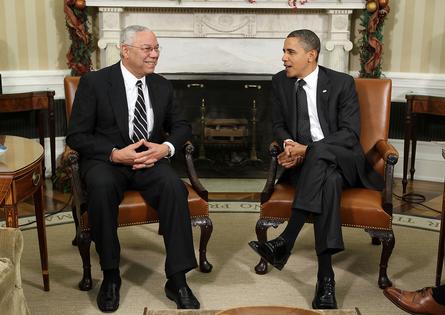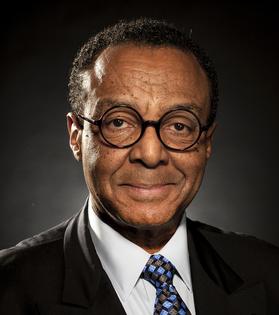Colin Powell, We’ll Miss You in the ‘Sensible Center’
When I heard that former Secretary of State Colin Powell had died, my mind raced back to the autumn of 2004, when I asked him whether he had given a thought to resigning.
At the time, the Iraq War was going as badly as he predicted it might, back when he reportedly was the most prominent opponent within George W. Bush’s administration of such a drastic action.
“If you break it, you own it,” he reportedly had told President George W. Bush in what was quickly dubbed “Powell’s Pottery Barn rule.”
But his resistance eventually wore down against persistent war proponents. In February 2003, he delivered what he later would call a painful “blot” on his otherwise spotless record: a 76-minute speech to the United Nations in support of war to rid Iraq of its alleged weapons of mass destruction.
As the intelligence about WMD later proved bogus, many war critics called for Powell to resign. I asked, had he thought about quitting?
“I don’t quit,” he responded bluntly. “There have been up days and down days,” he continued. “There always are in every job I have ever had. But I believe that we are doing some very important things in the world.”
But as he proceeded to list a bunch of those “important things” that, indeed, were significant, I could not help but recall a classic 1960s-era editorial cartoon of President Lyndon B. Johnson’s impressive list of legislative achievements partially covered by a huge ink blot with white letters saying, “Vietnam War.”
Similarly, Powell’s resume is full of landmarks and “first Blacks” — first Black secretary of state, first Black chairman of the Joint Chiefs of Staff, first Black national security adviser, etc.
But what also stands out is how back in the run-up to the 1996 presidential election, he was the first Black presidential possibility in those days to be robustly viewed by leading politicians, donors, journalists and other political junkies from both parties to potentially become the first Black president.
Then in late 1995 Powell dashed such hopes, announcing that he didn’t have the “fire in the belly” to take on the massive campaign that such an aspiration required.
That was too bad, in my view, since he seemed to offer so much of what he called “the sensible center” that our politics need in these fractious times — now more than ever.
In his bestselling autobiography “My American Journey,” he seems to agree. “(The) time may be at hand for a third major party to emerge to represent the sensible center of the American political spectrum,” he wrote.
But he wasn’t going to lead it.
“To be a successful politician requires a calling that I do not yet hear,’’ he wrote. “I believe I can serve my country in other ways. Nevertheless, I do not unequivocally rule out a political future.”
Well, time caught up with him, as it eventually does to all of us. That’s why when I see the glowing obituaries, richly deserved, pouring forth in Powell’s memory, I can’t help but think of what might have been — and how that prospect was humbled by what is.
On the racial front, Powell came along at a time when, in spite of such awful disasters as the 1992 Los Angeles riots, other new cultural ground was being broken by heroes of color like Oprah Winfrey and Michael Jordan, to name just two. Powell presented a vision, at least, of how our racial glass ceiling might be broken, too.
Fortunately Powell, a declared Republican who more recently turned independent, stayed with us long enough to help Barack Obama break through that presidential ceiling with his endorsement.
But the relentless backlash to Obama’s rise, including baseless paranoid fears that he might be a secret immigrant and Muslim, offer a hint of what would have been in store for Powell, born in the United States to Jamaican immigrant parents.
So maybe it’s just as well that Powell didn’t run. I didn’t used to think that. But the continuing political polarization that was only beginning in the 1990s has persuaded me. Republicans have gone further to the right since then and Democrats to the left. What we need is leadership that can rebuild that sensible center. It wasn’t Powell, but he helped to prepare the way.
========
(E-mail Clarence Page at cpage@chicagotribune.com.)
©2021 Clarence Page. Distributed by Tribune Content Agency, LLC.
(c) 2021 CLARENCE PAGE DISTRIBUTED BY TRIBUNE MEDIA SERVICES, INC.










